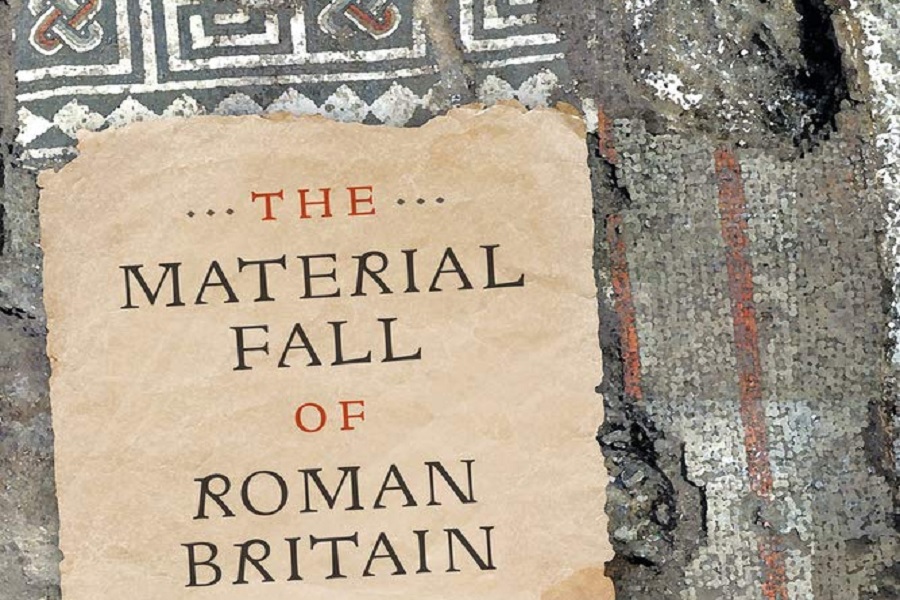Publication of ‘The Material Fall of Roman Britain’ was delayed by the pandemic but is now available.
The book tackles a challenging topic from a new perspective. What can the growing body of archaeological evidence tell us about Britain in the 5th century – a period for which contemporary written sources are virtually non-existent.
This is of keen interest to archaeologists and historians in and around Peterborough as we try to understand the demise of the thriving Roman economy in our region. How did one of the leading centres of pottery production lose its skills and its markets? What happened to the great villa estates of the Nene valley? When and why was Durobrivae so completely abandoned?
In her new book Robin Fleming suggests that the period between AD350 and 550 has been poorly served by previous scholars. The Roman specialists concentrate on “romanisation” during the earlier phases of Roman Britain. The Anglo-Saxon specialists emphasise ethnicity and migration, particularly after 500. Both groups carry accumulated baggage based on repeated re-telling of scant historic accounts which are often closer to storytelling than evidence based history.
Fleming seeks to redress this by relying instead on the material culture from this period, discovered through archaeology. Chapter by chapter she builds a narrative informed by different classes of material – plants, animals, pots, metal etc. She also takes a look at what the fast evolving techniques of aDNA and isotope analysis can reveal about migration and ethnicity. This more objective methodology echoes the kinds of approach taken by John Blair with respect to the later Medieval periods.
The rapid demise of the Roman economy once political and fiscal control was abandoned is a major theme. Within a few generations skills such as iron and copper smelting, stone quarrying, commercial butchery, horticulture, glass making and production of wheel thrown kiln fired pottery were lost. Fleming points out that only 15% of the British population was closely bound to the interests of the Roman state. She emphasises the complex networks of interactions and dependencies which fell apart once the surplus driven economy associated with the colonial military presence and taxation was removed. She paints a convincing picture of a quick return to a largely subsistence form of economy, with practices and preferences driven by necessity, bottom up rather than through mass migration or the dominance of new political elites. That is not to say that a new “fusion corridor” was not emerging which was bringing closer alignment with northern Europe and Scandinavia.
The book contains a lot of detail about a wide range of topics and perhaps surprisingly few maps and illustrations. However it is, nonetheless, reasonably digestible, even for the amateur historian/archaeologist. This is helped by separating out comprehensive notes and source information; these represent a third of the 300 page work.
The approach taken is refreshing in that it chimes with what we are seeing from commercial excavations, PAS finds and our local digs over recent years. The re-use of materials. The scavenging of stone walls. The re-purposing of buildings. The closing of wells and ovens. The continuity of some sites and traditions from the late Iron Age to the early Medieval period; the dislocation of others.
One is struck not by the paucity of information but by the overwhelming volume, diversity and complexity of information. It is going to require a generation of papers, books, updated museum displays and documentaries to fully flesh out and communicate the history of the post-colonial century in a more scientific manner. Perhaps we will then truly leave behind such misleading concepts as the “Dark Ages” and “Anglo-Saxons”. The Material Fall of Roman Britain is important in setting a new direction for the study of this period.
Robin Fleming is Professor of History at Boston College, USA
The book’s publisher, CAP, is organising an online launch for the book in association with the University of Pennsylvania Press, due to take place on 5th July 2021 at 6:30pm. The event will feature the author in conversation with Alex Woolf (Department of Medieval History, University of St Andrews) and free tickets are available to book now via Eventbrite.



